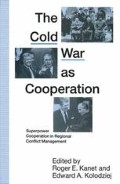Abstract
South Asia is often thought to be one region where the United States and the Soviet Union have cooperated even as they have pursued their own — sometimes conflicting — Cold War objectives. Their support for New Delhi in the 1962 Sino-Indian war, their large-scale economic aid projects in India (and their smaller, but important programs in other regional states) and their de facto willingness to let one side or the other broker regional conflicts are frequently mentioned in this context. Further, US-Soviet discussions on non-proliferation — now regularly conducted at a high level — often deal with South Asia, since the region contains the two most likely candidates for the title of newest nuclear weapon state.1
Access this chapter
Tax calculation will be finalised at checkout
Purchases are for personal use only
Preview
Unable to display preview. Download preview PDF.
Notes
Barry Buzan has developed the concept of’ security complex’. See Buzan, ‘A Framework for Regional Security Analysis’, in Buzan and Gowher Rizvi, South Asian Insecurity and the Great Powers (New York: St. Martin’s Press, 1986)
See Josef Korbel, Danger in Kashmir (Princeton: Princeton University Press, 1966), p. 156.
For a skeptical history of Indo-Soviet relations see S. Nihal Singh, The Yogi and the Bear (New Delhi: Allied, 1986).
See Ravi Rikhye, The War That Never Was (New Delhi: Lancers International, 1988).
These remarks were recorded by Averell Harriman. See W. Averell Harriman and Elie Abel, Special Envoy to Churchill and Stalin, 1941–1946 (New York: Random House, 1975), p. 266
For two excellent studies see Jerry F. Hough, The Struggle for the Third World: Soviet Debates and American Options (Washington: Brookings, 1986)
Rajan Menon, Soviet Power and the Third World (New Haven: Yale University Press, 1986)
See the vigorous defense of Yalta by Soviet scholars in K. Subrahmanyam and Jasjit Singh, (eds), Security Without Nuclear Weapons: Indo-Soviet Dialogue (New Delhi: Lancer International, 1986), p. 212.
In the conclusion to Stephen P. Cohen (ed.), The Security of South Asia: Asian and American Perspectives (Urbana: University of Illinois Press, 1987).
Editor information
Editors and Affiliations
Copyright information
© 1991 Roger E. Kanet and Edward A. Kolodziej
About this chapter
Cite this chapter
Cohen, S.P. (1991). Superpower Cooperation in South Asia. In: Kanet, R.E., Kolodziej, E.A. (eds) The Cold War as Cooperation. Palgrave Macmillan, London. https://doi.org/10.1007/978-1-349-11605-8_11
Download citation
DOI: https://doi.org/10.1007/978-1-349-11605-8_11
Publisher Name: Palgrave Macmillan, London
Print ISBN: 978-1-349-11607-2
Online ISBN: 978-1-349-11605-8
eBook Packages: Palgrave Political & Intern. Studies CollectionPolitical Science and International Studies (R0)

